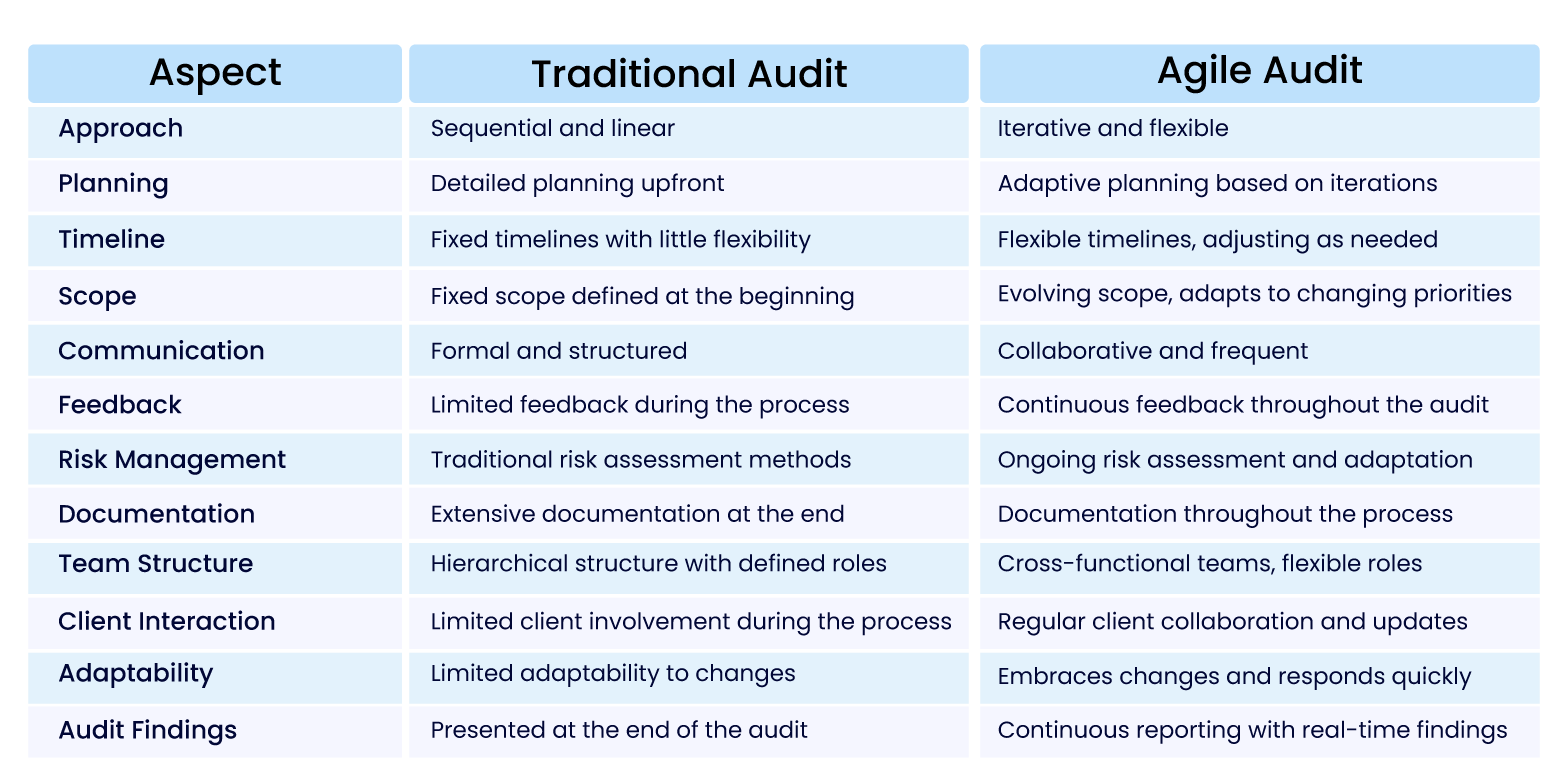Agile auditing: A Essential Guide

What is agile auditing?
Agile auditing represents a modern paradigm shift in the traditional auditing process by integrating principles derived from agile project management methodologies. This innovative approach places a paramount focus on continual engagement with stakeholders, flexible and iterative work processes, and the ability to promptly adapt to evolving conditions throughout the entire audit engagement.
What is an agile audit approach?
The agile audit approach is distinguished by its incremental nature, collaborative ethos, and a steadfast commitment to delivering consistent value frequently and predictably. Auditors, operating within short cycles referred to as ‘sprints,’ strategically prioritize tasks based on risk and importance. Regular feedback from stakeholders is sought, fostering a dynamic and responsive approach to audit plans that continuously evolves with ongoing findings and organizational changes.
What is traditional 🆚 agile audit?
Traditional audit and agile audit are two different approaches to conducting audits, each with its own set of principles and methodologies. Here’s a brief overview of both:

What are the main types of audit?
There are several main types of audits that organizations may conduct, each serving a specific purpose. Here are the most common types of audits:
1. Financial Audit: Scrutinizes financial statements, transactions, and internal controls for accuracy and transparency.
2. Operational Audit: Evaluates operational processes and internal controls to enhance overall efficiency and effectiveness.
3. Compliance Audit: Ensures strict adherence to laws, regulations, and internal policies.
4. IT Audit: Evaluates IT systems, infrastructure, and security measures for reliability and security.
5. Environmental Audit: Assesses compliance with environmental regulations and sustainability practices.
6. Integrated Audit: Integrates elements of financial, operational, and compliance audits for a comprehensive organizational assessment.
What are the benefits of agile auditing?
Agile auditing, is a relatively new concept that has emerged as a result of the growing popularity of agile methodologies in software development. Agile auditing is all about combining traditional auditing techniques with the principles of agile development, resulting in a more efficient, effective, and collaborative approach to auditing.
- Improved Collaboration:
Encourages closer collaboration between auditors and development teams, fostering a more fruitful and less confrontational auditing experience. - Increased Efficiency:
Enables auditors to focus on higher-risk areas, resulting in a more efficient use of resources and the delivery of more significant value to the organization. - Better Risk Management:
Agile auditing helps organizations identify and manage risks more effectively by focusing on the areas that pose the greatest risks to the project. This enables organizations to allocate their resources more strategically and prioritize their efforts on the most critical areas. - Enhanced Stakeholder Engagement:
Encourages stakeholders to actively participate in the audit process, leading to more effective risk management and a more robust control environment. - Faster Turnaround Times:
Allows for quicker identification and resolution of issues, reducing time spent on discussions and paperwork, and enabling rapid implementation of changes. - Improved Audit Quality:
Promotes a more structured and organized approach to auditing, ensuring findings are documented and tracked for higher audit quality. - Better Use of Technology:
Leverages technology to automate repetitive tasks, allowing auditors to focus on more complex and high-risk areas. - Enhanced Communication:
Fosters improved communication between auditors and stakeholders, ensuring everyone is on the same page and issues are addressed promptly. - Increased Relevance:
Ensures audits remain relevant and timely, addressing the most pressing issues facing the organization. - Greater Flexibility:
Allows for greater flexibility in the audit approach, enabling auditors to adapt to changing circumstances and priorities.
How Does Euro Tech Conseil Company Support Agile Auditing?
Euro Tech Conseil’s commitment to supporting Agile Auditing involves a comprehensive strategy:
- Fostering an Agile Culture and Mindset: Cultivating an organizational culture that values collaboration, adaptability, and continuous improvement.
- Training and Education: Providing specialized training on Agile principles, methodologies, and tools to ensure audit teams possess the necessary skills for effective implementation.
- Agile Framework Adoption: Adopting a specific Agile framework tailored to the unique needs of auditing processes, guiding planning, execution, and review phases.
- Cross-Functional Teams: Forming cross-functional audit teams that bring together individuals with diverse skills and expertise, enhancing the ability to address various aspects of the audit collaboratively.
- Iterative Auditing Process: Embracing an iterative approach to auditing, where audits are conducted in short cycles with a focus on frequent feedback, adaptability to changes, and continuous improvement.
- Adaptive Planning: Shifting from traditional, detailed upfront planning to adaptive planning, recognizing the importance of adjusting audit plans based on evolving information and priorities.
- Continuous Stakeholder Engagement: Actively involving stakeholders throughout the audit process to ensure transparency and alignment with organizational goals.
- Agile Tools and Technologies: Implementing Agile-friendly tools and technologies that facilitate communication, collaboration, and visualization of audit progress.
- Regular Retrospectives: Conducting regular retrospectives at the end of each audit iteration, encouraging teams to reflect on their performance, identify areas for improvement, and implement changes in subsequent iterations.
- Risk-Based Approach: Utilizing a risk-based approach within the Agile framework, acknowledging the importance of early identification and addressing risks to enhance overall risk management.
- Value-Driven Reporting: Shifting towards value-driven reporting, where audit reports are delivered incrementally, providing meaningful insights throughout the audit process.
- Emphasis on Learning and Upskilling: Encouraging a culture of continuous learning and upskilling among audit teams, recognizing the dynamic nature of Agile Auditing requires ongoing development of skills and knowledge.
- Integration of Technology: Leveraging technology to enhance the efficiency and effectiveness of audit processes, including data analytics, automation, and cybersecurity considerations.
Euro Tech Conseil’s holistic approach to supporting Agile Auditing reflects a commitment to fostering an environment where audit teams can seamlessly adapt to change, collaborate
